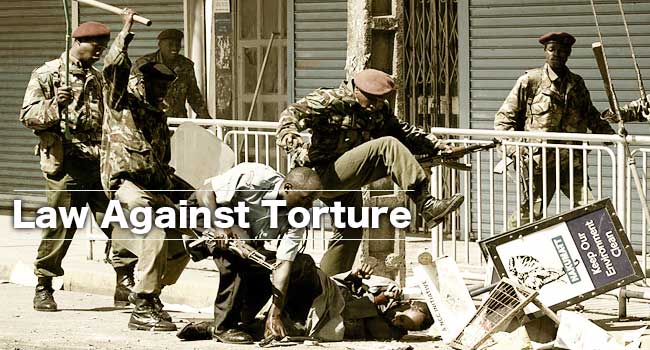Law Against Torture

The UN Committee Against Torture has urged Kenya to enact a 'Prevention of Torture Bill' to render all acts of torture punishable. It has termed it as a matter of urgency for the government to table the bill in Parliament, so as to provide a comprehensive definition of torture in line with Article 1 of the Convention against Torture and Other Cruel, Inhuman or Degrading Treatment or punishment.
The Article 1(1) of the Convention defines torture to mean "...any act by which severe pain or suffering, whether physical or mental, is intentionally inflicted on a person for such purposes as obtaining from him or a third person information or a confession, punishing him for an act he or a third person has committed or is suspected of having committed, or intimidating or coercing him or a third person, or for any reason based on discrimination of any kind, when such pain or suffering is inflicted by or at the instigation of or with the consent or acquiescence of a public official or other person acting in an official capacity. It does not include pain or suffering arising only from, inherent in or incidental to lawful sanctions"
The call by the UN Committee has been fuelled by various cases where the Kenya police force has been accused of torture, which has promoted a culture of impunity and abuses by Kenya's law enforcement agencies; that appears to have encouraged a spate of police abuses in Nairobi. In a recently launched report on the plight of refugees in Nairobi's Eastleigh area, cases of abuses cited include murder, rape and assault. This also follows an earlier move by the United Nations Commission on Human Rights (UNCHR) to question Kenya on why the Executive arm of government continues to breach court orders and for failing to prosecute police officers engaged in torture.
Thus, the committee recommends that the appropriate penalties of all acts of torture under law be legislated.
The "Torture Convention", also known as The Convention against Torture and Other Cruel, Inhuman or Degrading Treatment or Punishment was adopted by the General Assembly of the United Nations on 10th December 1984 .The Convention, which Kenya is among the State parties', entered into force on 26th June 1987.
Article 2 of The Convention requires each State party to take effective legislative, administrative, judicial or other measures to prevent acts of torture. Article 4 further reiterates that acts of torture are serious criminal offences within the legal systems of the member states.
Article 25(a) of the Constitution provides that freedom from torture and cruel, inhuman or degrading treatment or punishment shall not be limited.
More light should be shed into this matter and legislations ought to be added to give flesh to the skeleton frameworks in place in order to counter the culture of impunity and create deterrence to future attempts of torturous treatment.


